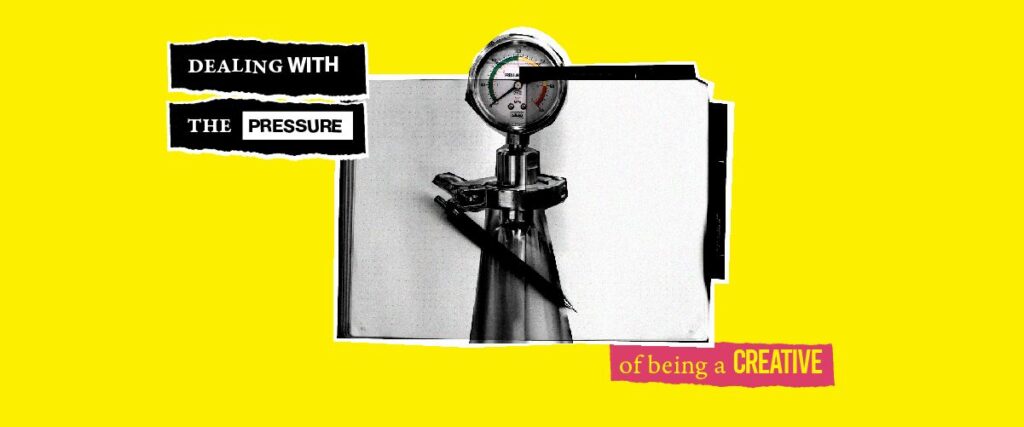
About a year after taking a job as a creative, I wrote an ad that unexpectedly blew on a tiny scale, but it was quite big for my organization. People called it The Ginger Ad. You will most likely not have come across it but just know that it was spicy. People praised me, and I felt that thing for the very first time. PRESSURE!
I knew the next ink I would put to paper would not follow the English superlative progression spice, spicier, spiciest because, like a painter whose magnificent artwork emerges from accidental spillage of paint, the ad felt like a glorious mistake.
Although people sang my praises, I found myself feeling some anxious-fearful-despair type of way because of the uncertainty of my next work bringing me better or at least the same level of accolades as the former. Can you relate?
Creativity
The way societies have thought about creativity has changed throughout history. Early on, in ancient Rome and ancient Greece, creativity was associated with deity, and the people who did works of art were considered just vessels*. And as described by Elizabeth Gilbert in Your Elusive Creative Genius, what that meant was; if the output was good, the vessel couldn’t take all the credit and if it wasn’t, it wasn’t entirely considered the fault of the vessel. But in the Renaissance, people started to believe that creativity came totally from the individual.
What is the point of the history class?
This is good news and bad news.
Ascribing creativity to humans has enabled us to own our skill. We’ve learnt to creatively make meaning of this world and go all the way to create amazing works of art—the movies that leave us in tears, poems that read us, music that transports us to another world, the skit that makes us laugh so hard and breathe for a moment, the awesome burden of choosing which type of rice we want, the groundbreaking discovery of antibiotics, … and the next creative piece we are yet to see.
Human creativity opened a sphere of endless possibilities for us. It has made our world (people inclusive) progress and will still make it progress in ways unimaginable. Is this not good news?
Here’s the other side. When creativity was associated with deity, people could separate themselves from their work, but now that we have the mantle, we have been saddled with the consequences of not being able to separate ourselves from what we do.
Our work is like an embryo we conceive. It’s connected to us as strongly as a placenta connects a baby to a mother. We carry it for as long as it takes, fuel it with our flesh and blood, experience uncountable miscarriages and go through the grueling labor of finding the process that will make us a fit mother, ready to produce something admirable and complete such that when we give birth, we see only ourselves and our work in the picture.
Because of this, we have to deal with much more than we can bear. The pressure of our next work performing better than the former. The fear of our work being rejected. Dealing with our work going to a world where everyone is critical of everything. The blank page can make or mar you. We are enslaved to what is yet to happen. Bad news, right?
Norman Mailer, who had 11 best-selling books, said in the last interview before he died, “Every one of my books has killed me a little more”.
Where do we go from here?
The Creator
Ascribing creativity to humans, apart from liberating people to own their skill, speaks truth in line with what the Bible says about us, that we are created in the image of God. The God behind the piece of artwork, Earth. Nature screams his glory—the rhythmic rising and setting of the sun. The trees dancing lightly to the songs of the birds and the tender whisper of the breeze, in the cool of the day. The expanse of blue and clear waters revealing the beautiful sky. At the point when time stops and we lose our breath because of the beauty we behold, we can convincedly say this is not just God but a creative God. Let’s bring it home.
Psalm 139:14
“I will praise You, for I am fearfully and wonderfully made; Marvelous are Your works, and that, my soul knows very well.”
Humans are a remarkable work of God. And since we have been created in his image, rightly so, that we have that thing that pushes us to do creative work. Any time we produce a creative piece, we need to remind ourselves we are not the creator, but his creation given the ability and opportunity to reflect his creative character. The builders of the tower of Babel forgot this. They wanted to make a name for themselves by building a mighty city and a tower with its top in the heavens. That tower is creative but anything we create to serve our name, is just a way of being creatively idolatrous. And we need to constantly fight against building a tower of babel through our creative work.
Here are some creative ways we can fight:
Seizing the opportunity of Sunday worship to take our eyes off ourselves and our work, and remind our sinful hearts that God is the creator, and He deserves all the glory.
Repenting after successful work. Let it remind you of the gospel, how God, through Jesus, made a beautiful mirage from your brokenness. Receive the accolades but acknowledge your identity in God, thanking him for the opportunity and asking that he rid you of pride and self.
When our work is rejected, like the psalmist, we need to speak to our souls, not to slip into slavery. Because of our identity in Christ, as God’s children, we have the freedom to fail and not be defined by it. For us, failure presents the opportunity to receive God’s strength and remind us that we are broken, and we are in a broken world. Here, we can join in the song of creation groaning for God’s perfect world.
When it’s difficult to carry on, we need to look to the most creative piece that’s ever existed: The Cross. The cross was not beans. It cost God his son and cost Jesus his flesh and blood, to save us. Because God didn’t give up on us, looking at the cross will help us stubbornly show up again and again.
But the cross didn’t just change history and the present, it changed the future.
“I saw the Holy City, the new Jerusalem, coming down out of heaven from God, prepared as a bride beautifully dressed for her husband…Those who are victorious will inherit all this, and I will be their God and they will be my children”
A new world is coming. Creativity at its purest and finest. Bigger than what our minds can conceive. When Jesus comes, we’ll have the opportunity to perfectly put our creativity to use in God’s perfect world.
The way to deal with the pressure of being a creative is to constantly look at the creator who died to give us an identity that is not determined by success, failure, or the difficulty of the creative process, and a world, better than our mind at its most creative, can conceive.
Editor’s note
*History_of_the_concept_of_creativity
Mojirola is learning and unlearning about God and life and hopes to communicate this through her writing. She’s vulnerable towards delightful, flavourful books, and scrumptious, delicious, gorgeous foods.
